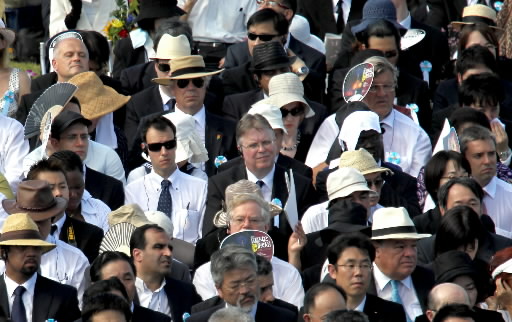Peace Memorial Ceremony attended by nuclear powers, including U.K. and France, for the first time
Aug. 9, 2010
by Aya Kano and Toshiko Bajo, Staff Writers
On August 6, John Roos, the ambassador to Japan from the United States, which dropped the atomic bombs on Japan, and representatives of the United Kingdom and France, both nuclear powers, attended the Hiroshima Peace Memorial Ceremony for the very first time. The number of participating nations this year reached 74, exceeding the record number of participating nations last year by 15. Praise for the nuclear powers' attendance was heard, including such remarks as "This is important progress for realizing a world without nuclear weapons."
Among the five original nuclear weapon states, China was the only one absent from the ceremony. David Fitton, charge d’affaires of the British Embassy, disclosed that the United Kingdom decided to take part in the ceremony after consultations with the United States and France. He also said he reached the conclusion that now was an appropriate time to attend the ceremony, with the international mood growing for nuclear disarmament and non-proliferation.
Christophe Penot, charge d’affaires of the French Embassy, agreed with the U.K. comment and said that it was important to demonstrate a commitment to nuclear disarmament by having the nuclear powers attend the ceremony. Vladimir Nabokov, First Secretary of Russia, stated that he was very pleased that representatives of the nuclear weapon states attended the ceremony on the 65th anniversary of the atomic bombing. Meanwhile, Mr. Roos issued a statement conveying the U.S. stance of seeking a world without nuclear weapons.
Jiba Kabua, the ambassador to Japan from the Marshall Islands, where the United States repeatedly conducted nuclear tests, said that the people of the Marshall Islands understood the horror of nuclear weapons through their own experiences, and that they could cooperate with Japan on their elimination. Sami Ukelli, the ambassador to Japan from Kosovo, which still bears the scars of ethnic conflict, said that a lasting peace was very important and expressed hope, saying that U.S. participation in the ceremony represented that nation's desire to build consensus about a nuclear-free world.
After the ceremony, 73 representatives from 49 nations listened to the A-bomb experience of Keijiro Matsushima, 81, an A-bomb survivor and resident of Saeki Ward.
(Originally published on August 7, 2010)
On August 6, John Roos, the ambassador to Japan from the United States, which dropped the atomic bombs on Japan, and representatives of the United Kingdom and France, both nuclear powers, attended the Hiroshima Peace Memorial Ceremony for the very first time. The number of participating nations this year reached 74, exceeding the record number of participating nations last year by 15. Praise for the nuclear powers' attendance was heard, including such remarks as "This is important progress for realizing a world without nuclear weapons."
Among the five original nuclear weapon states, China was the only one absent from the ceremony. David Fitton, charge d’affaires of the British Embassy, disclosed that the United Kingdom decided to take part in the ceremony after consultations with the United States and France. He also said he reached the conclusion that now was an appropriate time to attend the ceremony, with the international mood growing for nuclear disarmament and non-proliferation.
Christophe Penot, charge d’affaires of the French Embassy, agreed with the U.K. comment and said that it was important to demonstrate a commitment to nuclear disarmament by having the nuclear powers attend the ceremony. Vladimir Nabokov, First Secretary of Russia, stated that he was very pleased that representatives of the nuclear weapon states attended the ceremony on the 65th anniversary of the atomic bombing. Meanwhile, Mr. Roos issued a statement conveying the U.S. stance of seeking a world without nuclear weapons.
Jiba Kabua, the ambassador to Japan from the Marshall Islands, where the United States repeatedly conducted nuclear tests, said that the people of the Marshall Islands understood the horror of nuclear weapons through their own experiences, and that they could cooperate with Japan on their elimination. Sami Ukelli, the ambassador to Japan from Kosovo, which still bears the scars of ethnic conflict, said that a lasting peace was very important and expressed hope, saying that U.S. participation in the ceremony represented that nation's desire to build consensus about a nuclear-free world.
After the ceremony, 73 representatives from 49 nations listened to the A-bomb experience of Keijiro Matsushima, 81, an A-bomb survivor and resident of Saeki Ward.
(Originally published on August 7, 2010)







